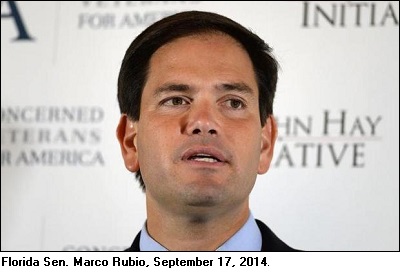
|
|

|
|
| April 25, 2024 |
|
Congressional Republicans look to block Cuba policy changes 
WASHINGTON--The shift in U.S. policy toward Cuba triggered fierce partisan warfare Wednesday in Congress, as some Republicans vowed to take strong steps to block the changes.
“I am committed to doing everything I can to unravel as many of these changes as possible,” said Sen. Marco Rubio of Florida, a view many top Republicans shared. Among the possible strategies: They could refuse to end the economic embargo of Cuba, block funding for a new embassy, or stall or defeat an ambassadorial nomination. President Barack Obama and Cuban leader Raúl Castro agreed Wednesday to free American aid worker Alan Gross on humanitarian grounds, while three Cubans convicted of spying went back to their country. The United States will now explore establishing an embassy in Cuba for the first time in 53 years, and ease travel and trade restrictions. Leading the opposition Wednesday were lawmakers with close ties to Cuba, notably Rubio, the son of Cuban immigrants. Obama’s action does not quite end the economic embargo against Cuba, since that’s up to Congress, which in the 1996 Helms-Burton Act toughened travel and economic restrictions against the island nation. The act said the embargo cannot be lifted until Cuba becomes democratic and its leaders do not include Raúl Castro or his brother Fidel. Obama pledged to work with Congress. He’s going to run head-on into a furious Rubio, who next year is expected to be chairman of the Senate’s Western Hemisphere subcommittee, which considers legislation dealing with Cuba policy. Senate Republican leader Mitch McConnell of Kentucky, who will be majority leader next year, told the Associated Press he supports Rubio’s position. “This Congress is not going to lift the embargo,” Rubio said flatly. Rubio is also mulling a run for the 2016 GOP nomination for the presidency. Any negotiation will take some time, predicted Sen. Ben Cardin, D-Md., a senior Foreign Relations Committee member. “It’s too early to predict what will happen,” he said. The money dispute could begin early next year. If Obama requests funds to build an embassy, a Republican-led Congress would need to approve the request. “I will do all in my power to block the use of funds to open an embassy in Cuba,” tweeted Sen. Lindsey Graham, R-S.C., who’s slated to become chairman of the Senate Appropriations Committee’s foreign operations subcommittee. The Senate also would have to confirm an ambassador nominee, and almost any Obama pick would be subject to brutal scrutiny. Just wait, Rubio warned Wednesday. The new policies will change nothing in Cuba. “They are not going to agree to anything that destabilizes their grip on power,” he said of the Cuban regime. “And the sooner policymakers like the president realize that, the less these sorts of ridiculous policies we’re going to get from them.” Overcoming strong Republican opposition to any part of the Obama policy could be tough, since the party will control 54 of the 100 seats in the Senate next year. In the House of Representatives, Republican leaders were adamant Wednesday that the president had blundered. House Speaker John Boehner of Ohio protested that Obama had made “mindless concessions to a dictatorship that brutalizes its people and schemes with our enemies.” Rep. Mario Diaz-Balart, R-Fla., branded Obama the “appeaser-in-chief.” Democrats were more sympathetic. “For too long our relationship has been soured by mistrust and clouded by memories of the Cold War,” said Senate Intelligence Committee Chairwoman Dianne Feinstein, D-Calif. “Reports that our countries will move to normalize relations are very welcome.” Democrats had some hope they could prevail, noting it’s been a long time since any true test vote on Cuba policy. Farm Belt Republicans often are seen as willing to ease embargo restrictions, and next year’s Senate will include 28 senators who have taken office since 2013. And an October New York Times poll found 56 percent of Americans approved of establishing diplomatic and trade relations with Cuba, while 29 percent disapproved. Among Republicans eager to improve relations is Sen. Jeff Flake of Arizona, who was on the plane that traveled to Havana to bring Gross home. “My sense is that most of my colleagues feel we are long past due” for change, he said. In a twist, he could find a top Democrat as a leading skeptic. Sen. Robert Menendez of New Jersey, the outgoing Foreign Relations Committee chairman whose parents were Cuban immigrants, was adamant Wednesday: “Let’s be clear, this was not a ‘humanitarian’ act by the Castro regime. It was a swap of convicted spies for an innocent American.” He said Obama’s action “vindicated the brutal behavior of the Cuban government.” (Source: McClatchy) Story Date: December 19, 2014
|